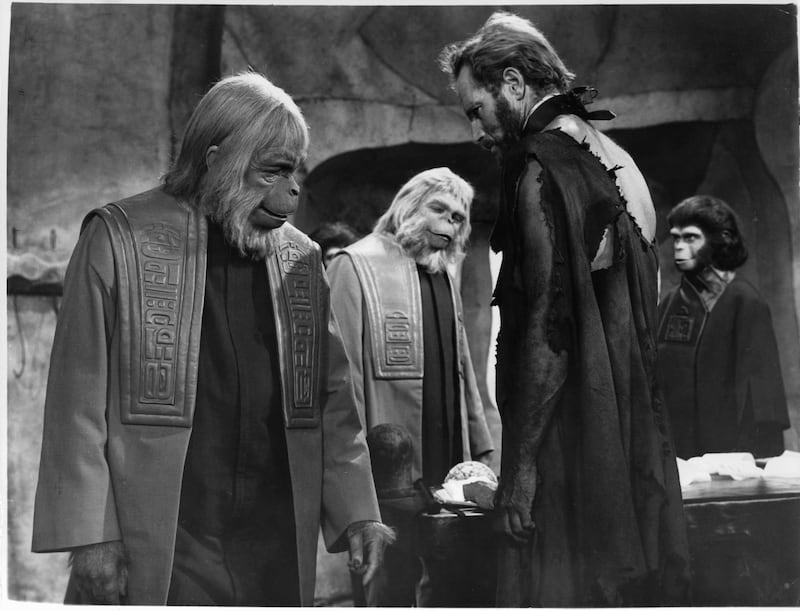With the latest instalment of the Planet of the Apes franchise in cinemas this week, we take a look at the history of the popular gorilla warfare action series.
1963: La Planete des Singes
Pierre Boulle’s original novel tells the story of four space travelers who discover a lush planet orbiting the star Beutelgeuse, where apes are the dominant species and humans are feral animals. As the novel progresses, we learn that humans were once at the top of the food chain, and trained apes to be used as servants. As the apes learned more from their human masters, including the power of speech, the humans became increasingly lazy and their brains began to decay, until the situation was reversed and the apes overthrew their former masters.
1968: Planet of The Apes
Franklin J Schaffner’s first film adaptation of the book, starring Charlton Heston, was a critical and box office hit, breaking box office records at the time, despite taking a few liberties with the original story. Heston’s George Taylor was a lone US astronaut who discovers the primate planet, the apes are rather less advanced than the literary version, reportedly to save on special effects, and, most famously, Taylor discovers that the planet is in fact a post-apocalyptic version of Earth in one of the most iconic final scenes in cinema history.
1970-1973: Sequels
Schaffner's film spawned four sequels, with diminishing budgets but still respectable box office performances. Schaffner and Heston would never return to the series, save for a cameo which saw Heston's character killed off in 1970's Beneath the Planet of the Apes. Roddy McDowell would sporadically reprise his role as Cornelius, and later Cornelius' son Caesar, though not in Beneath. The third film, 1971's Escape from, which saw Cornelius and his wife Zira travel to earth was a high point, but by 1972's Conquest of the laws of diminishing returns were in effect. 1973's Battle for was a new low, although it still covered costs, and the series was cancelled.
1974: Marvel Comics
There have been a few comic book versions of the Planet theme over the years, but by far the most successful was Marvel's Planet of the Apes, which ran until 1977. The comic featured adaptations of each of the films, new Apes stories, series news, essays, interviews and other material. It became one of Marvel's most successful titles, attracting 300 to 400 fan letters with every issue, so many that the studio had to suspend its practice of writing personal responses.
1974: TV series
Following the end of the films, CBS picked up the Planet franchise for TV. Roddy McDowell returned as new character Galen, a human friendly chimpanzee, but that wasn't enough to save the show from high production costs and low ratings, resulting in it being canned that same year after just 14 episodes.
1975: Animated series
The following year, NBC hoped to succeed where CBS had failed, with an animated TV adaptation, Return to the Planet of the Apes. The new makers reverted to well-known characters, including Cornelius, Nova and General Urko over the new characters of CBS' version, but the viewers weren't convinced, and this two was cancelled after just one, 13-episode series.
2001: Remake
Tim Burton came on board following years 'in development' while Fox had been trying to get a remake of the franchise of the ground. Mark Wahlberg is the unlucky astronaut this time, travelling through a wormhole and discovering a planet where humans are enslaved by intelligent apes. Tim Roth led the ape cast as General Thade alongside, naturally this being a Tim Burton film, Helena Bonham Carter as chimp Ari. Planet of the Apes was a commercial success, but mixed reviews and a disinclined Burton meant the planned sequel never went ahead.
2011: Reboot
Rupert Wyatt was in the director's chair for the first of the current reboot trilogy, Rise of the Planet of the Apes, with current director Matt Reeves taking over since 2014's Dawn of. The new interpretation moves the action to Earth, where a viral drug has given the apes advanced intelligence and Caesar has successfully led a revolt to overthrow their human masters. Things get worse for humanity in Dawn of, as we learn that the virus that enhances apes also kills humans, and a bitter war breaks out between the survivors of humanity and the liberated apes. The reboot series actually makes the apes more central to the plot than the humans, with Andy Serkis as Caesar the key ever-present cast member. Humans to have passed through in the three rebooted films to date include Gary Oldman, James Franco and now Woody Harrelson in War for.





